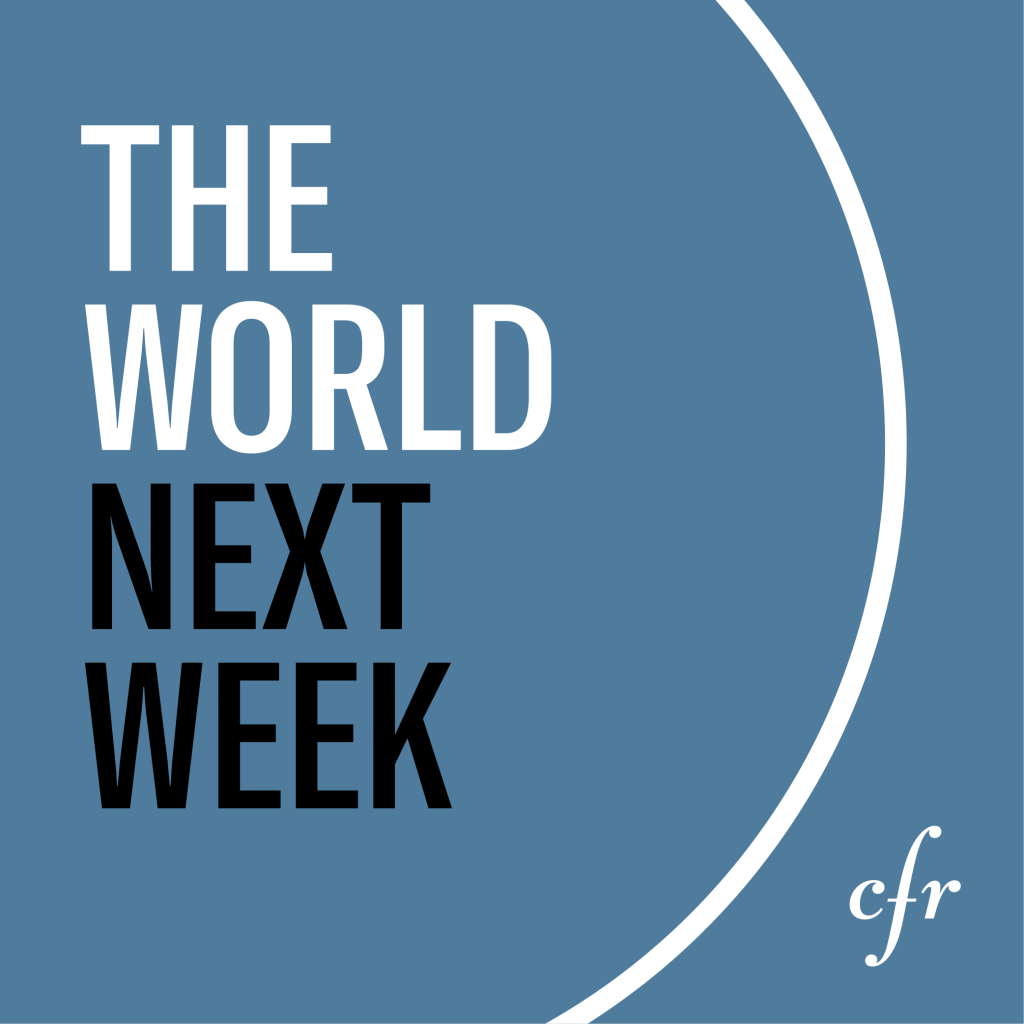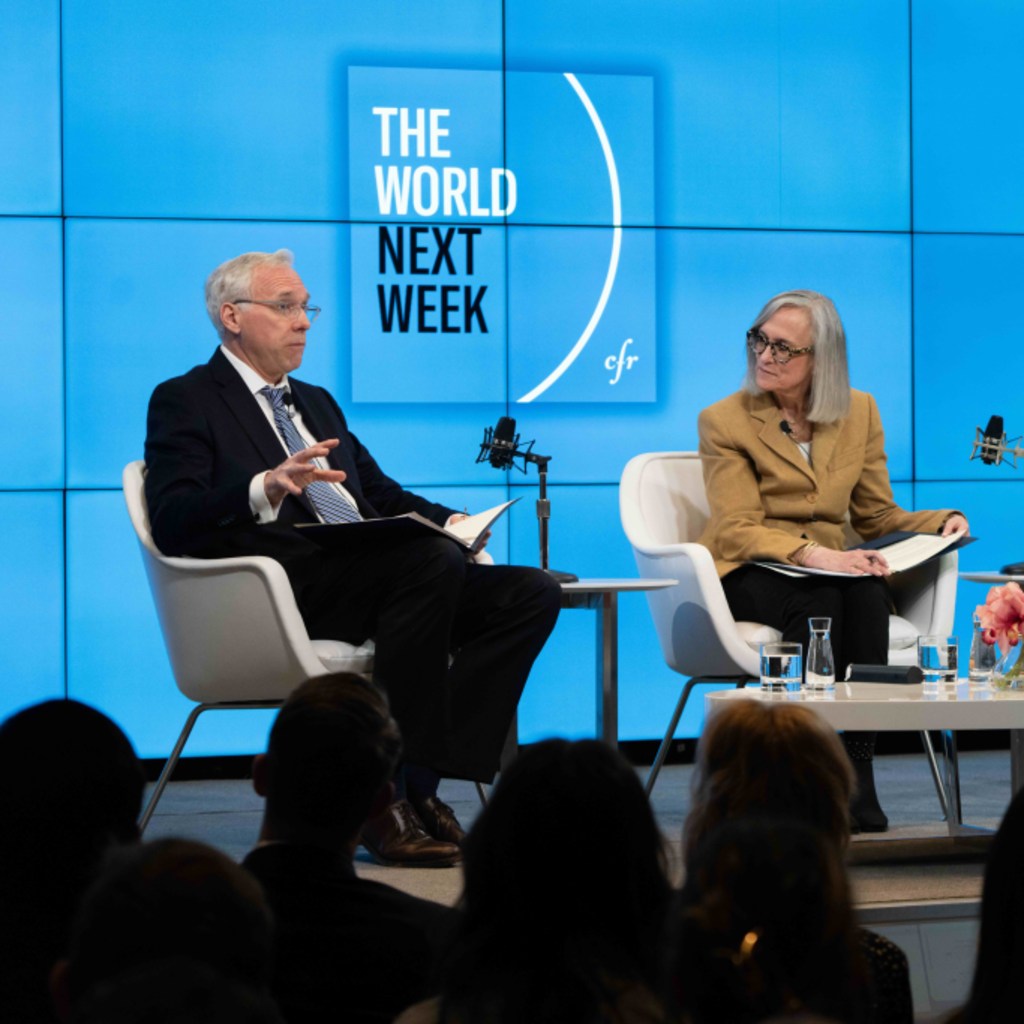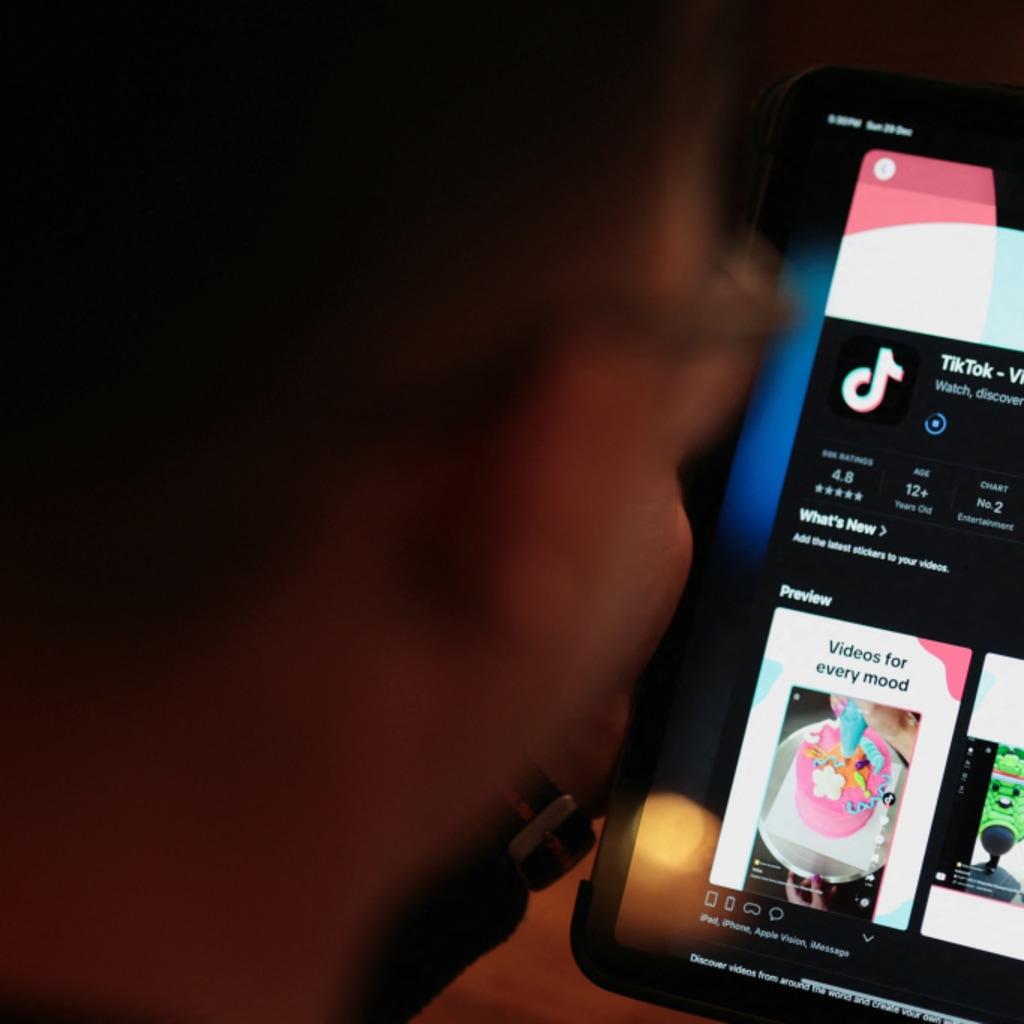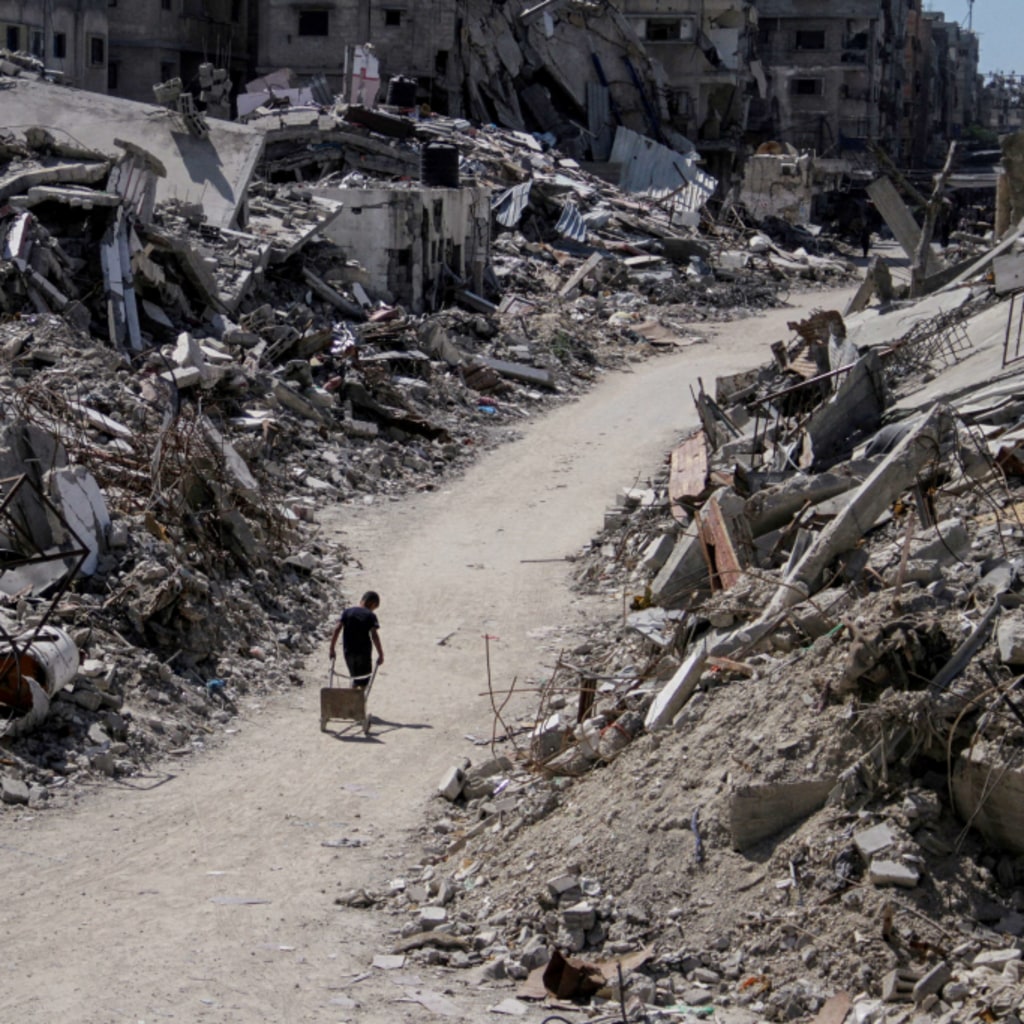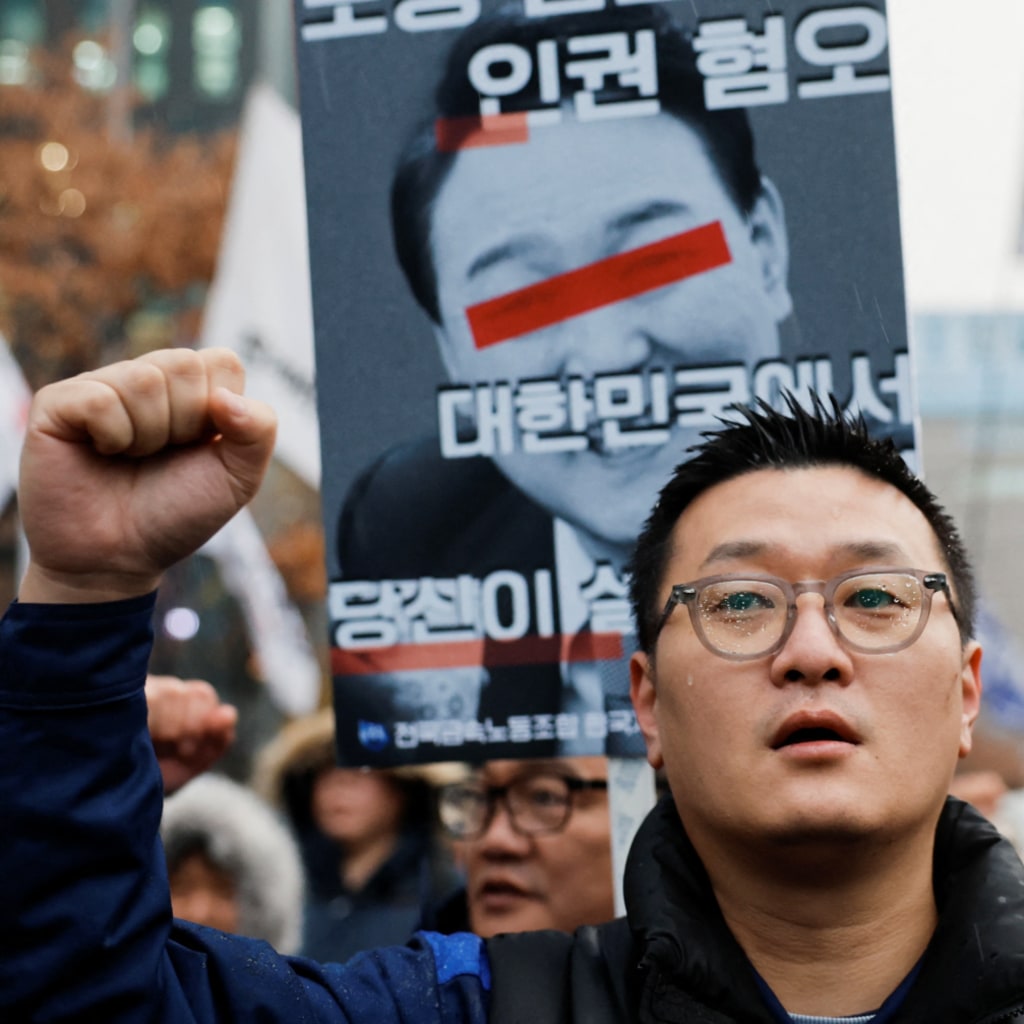Ukraine Pushes Into Russia, 2024 DNC Begins, Foreign Hacking Targets Trump and Harris, and More
Ukraine’s surprise incursion of Russia’s Kursk region captures territory and stuns the Kremlin; the Democratic National Convention kicks off in Chicago with concerns of divisions in the party over support for Israel in its war in the Gaza Strip; U.S. intelligence is on high alert after foreign hacking attempts on both former President Donald Trump’s and Vice President Kamala Harris’s presidential campaigns; and Mexico turns down Ukraine’s request for it to uphold warrants to arrest Russian President Vladimir Putin by the International Criminal Court.
Published
Host
- Carla Anne RobbinsSenior Fellow
Guest
- Miriam ElderEdward R. Murrow Press Fellow
Associate Podcast Producer
- Ester FangAssociate Podcast Producer
Editorial Director and Producer
- Gabrielle SierraDirector, Podcasting
Show Notes
Mentioned on the Podcast
Tim Alberta, “Trump Is Planning for a Landslide Win,” The Atlantic
Kevin Collier, Ken Dilanian, and Dan De Luce, “FBI Says It’s Investigating Efforts to Hack Trump and Biden-Harris Campaigns,” NBC News
Alina Lobzina and Anton Troianovski, “Ukraine’s Incursion Into Russia Flips the Script on Putin,” New York Times
Jonathan Weisman, “Worried About a Convention Clash, Democrats Woo Uncommitted Delegates,” New York Times
Transcript
ROBBINS:
In the coming week, Russia scrambles to push back against a surprise Ukrainian incursion. Thousands of delegates and protesters gather in Chicago for the Democratic National Convention and U.S. election campaigns consider how to safeguard against foreign cyber attacks, as well as homegrown misinformation campaigns and other troubles. It’s August 15th, 2024 and time for The World Next Week.
I am Carla Anne Robbins. Bob McMahon is off this week in Scotland, lucky man. And today we’re joined again by our colleague and friend, Miriam Elder. Miriam’s a reporter and editor, specializing in Russia. She’s worked for the Moscow Times and the Guardian as well as BuzzFeed and Vanity Fair. She just finished a year as the Murrow Fellow here at CFR. Miriam, welcome back to the show. We are so lucky to have you with us.
ELDER:
It’s my pleasure, and I’m the lucky one.
ROBBINS:
Miriam, let’s start with the Kursk region of Russia where last week starting on August 6th, Ukrainian forces suddenly broke through Russia’s border. Surprising not only the Russians, but pretty much everyone else, Kyiv’s backers in Washington. I think the Pentagon was pretty surprised, the White House as well. The Ukrainians have since gained controlled over a few hundred square miles of territory, and the Ukrainians are claiming around 390 square miles. They’ve taken more than a hundred Russian soldiers prisoner. This is the biggest attack on Russian military airfield since the war began. Some 130 thousand people have fled or been evacuated from Russian towns and villages. What do you think Ukraine is going for here and do you think it’s going to pay off for them?
ELDER:
What a stunning turn of events. Like you say, not only has Ukraine taken territory in Kursk, but on Wednesday they launched a massive drone attack on Kursk, but also on Voronezh, Belgorod, Nizhny Novgorod. This is really the Russian heartland. Ukraine has sporadically attacked Russian territory mainly by drone in the past, but we’ve never seen a coordinated attack of this size since Russia launched its full-scale invasion two and a half years ago. The war has really, as they say, and as Zelenskyy has said himself, it’s really come home.
As for what they’re trying to achieve and whether it has paid off, that remains to be seen. We’re well into the second week of this attack, and Ukraine has not outlined its goals. One theory is that it’s designed to pull Russia’s attention and resources from a grinding fight in Donetsk and towards this incursion. So far that does not seem to be happening. There are unconfirmed rumors that Russia will throw conscripts at the battle in Kursk rather than the hardened troops that they have serving in the territory that it is occupying in Ukraine. But we’ll have to see how things unfold in coming days.
ROBBINS:
Why does it matter if they throw conscripts at it? Certainly they won’t fight as well. Does that help Ukraine beyond that?
ELDER:
Well, it helps in terms of Russian public opinion, and that’s another thing that experts and the Ukrainians themselves are really watching. Russia, even though it’s an authoritarian state, public opinion matters to some degree. If you’ll remember, both in the war in Afghanistan with the Soviet Union and then the war in Chechnya, it was the mothers of conscripted soldiers that really formed a significant movement against the Russian authorities. So there’s a lot of fear in the Kremlin against throwing conscripts at the issue, both because as you say, they are not trained in the way that the other troops are, but also for any blowback in Russian society. That remains the number one goal of Vladimir Putin, is his hold on power.
ROBBINS:
I’ve been actually really quite surprised, the White House and the State Department, the Pentagon, they’ve all been doing this dance about, are the Ukrainians using American weapons? Are they using NATO weapons? Did they tell you? Did they not tell you? Basically what people are saying, not for attribution is, “They didn’t tell us. We were surprised as the Russians were.” Right now, everyone’s doing a happy dance because the Ukrainians seem to be doing remarkably well here and humiliating the Russians.
But up until now, and particularly the United States has been really concerned about pushing Putin too hard and what he could possibly do, and this has been, I think they’ve held the Ukrainians back to the detriment of their ability to fight the war. Is this dangerous? Could Putin lash out in some really frightening way or have we basically self deterred too much and this is perhaps the only thing to do to push them back as hard as possible?
ELDER:
I think both those things are true. On the one hand, there’s definitely a lot of concern that Putin can lash out in some unforeseen way. He hates to be humiliated, and how humiliating is the fact that the Ukrainians literally just rolled over the border with no resistance? So there is a lot of fear. He certainly very angry. He had a televised meeting with some officials earlier this week and it was clear, clear that he was infuriated with them and with the whole situation. Whether the West has put too many constraints on Ukraine, that can also be true. The Ukrainians certainly think so. The war has not been going their way; certainly, this year we had the failed counteroffensive. And how stunningly have they changed the narrative literally overnight?
ROBBINS:
How is this playing inside of Ukraine? People were really despairing and I think also questioning Zelenskyy’s leadership because things have been going so poorly, is this really giving him a big boost at home?
ELDER:
It’s certainly a morale booster. I don’t know that it will change overnight political feelings about him, but it also sort of doesn’t matter because there are no elections for the foreseeable future. But it’s certainly the sort of morale boost that you needed first and foremost within the armed forces themselves and then within broader society for sure.
ROBBINS:
Might this affect any future peace negotiations? Zelensky certainly doesn’t seem particularly interested in negotiating right now when the Russians are holding so much of his territory, but is this setting them up for the beginning of peace negotiations potentially?
ELDER:
It could potentially play a role for sure, and I’ll give a big if here. But if Ukraine can hold on to this territory, which is a big if, there is thinking that if there were peace negotiations at some point in the future, the Ukrainians could use it as a bargaining chip. There is growing support within Ukraine, or not support, but understanding that this war might have to end in a way that is not just outright military victory, meaning through talks. But there is still a lot of opposition to ceding any Ukrainian territory to Russia. In theory, if the Ukrainians could hold on to this piece of Russian territory, maybe they could use it as a bargaining chip with some of the territory that Russia is trying to hold. But as you say, there are no talks on the horizon, but we’ll see what happens over the coming months.
ROBBINS:
I read this really intriguing quote, I think it was in the Times today. It was a woman in a shelter who had been evacuated from the Kursk region, and she said she had been in the shelter since the start of the war. When she was asked how long that was, what she really meant was since the start of the Ukrainian invasion. Here was somebody who lived right next to the border with Ukraine, and as far as she was concerned, the conflict only began last week.
ELDER:
Right? That’s by design of the Russian government. There are certain regions that have faced drone attacks and things like that from Ukraine, and there’s certainly people who have lost loved ones fighting for the Russian military over in Ukraine. But for the most part, Vladimir Putin’s message, the message of the entire media apparatus that he controls, has been, “Things are fine. Keep living your life.” This is the contract that he has struck with the Russian people for decades now. “Don’t worry about politics, don’t worry about what’s going on over here or over there. Focus on your life. Let me handle the big stuff.” That’s why it’s so important that this attack is really bringing the war home to people in a very visceral way.
ROBBINS:
I suppose one final question here, which is, we’ve heard about destruction of some military bases or airstrips. Does this have any, giving the Ukrainians, any tactical benefits as well? Are they destroying enough equipment to make a difference in the war or is this really mainly psychological?
ELDER:
No, I think it’s both strategic and psychological and to some degree tactical as well. Some of the airfields that they have struck have been used by Russia to attack certain parts of Ukraine. So I think the idea is also to limit Russia’s ability to attack certain parts of the country. But again, I think that it’s over time that we’ll understand what the Ukrainians are really trying to achieve here. Just as they launched this attack in secrecy, they have kept the goals, be they strategic, tactical, what have you, they’ve kept everyone in the dark by design.
But Carla, let’s bring it back to the United States. Next Monday, August 19th, the Democratic National Convention begins in Chicago. The Democrats have endured a long tumultuous campaign season, to put it lightly, but the party appears to be enthusiastically behind Kamala Harris. In a virtual roll call, the Harris-Walz ticket secured the support of 99 percent of the Democratic National Committee delegates. But still there are a small number of uncommitted delegates and a somewhat larger number of uncommitted voters opposed to U.S. support for Israel in the Gaza war. And thousands of protesters are vowing to make their voices heard outside the convention hall. So Carla is the Democratic Party as united behind Harris as it seems.
ROBBINS:
We’ll see, of course. The Democrats have a long history of forming circular firing squads, and that didn’t happen in the handoff from Biden to Harris. There was no competition for the nomination. There’s not going to be a brokered convention. In fact, there isn’t even going to be a roll call vote next week. As you said, that was taken care of virtually. And as you note, Harris and their running mate, they secured the overwhelming majority of these votes. But the divisions over Gaza and U.S. support for Israel have not gone away, and it is the most profound division within the party. I think Harris has done a good job, as good a job as can be expected, trying to navigate what is really politically unnavigable inside the Democratic Party.
Her markedly different rhetoric on the suffering in Gaza and her earlier-than-Biden call for a cease-fire has earned her another look from some pro-Palestinian groups. But just a look, they want a decision and they’re not going to get one. She also got a lot of attention for her steely reaction to chanting protesters at a rally in Detroit last week, which is now being referred to as the Detroit staredown. It’s not going to get any easier than that. Certainly not going to be easy next week when thousands, potentially tens of thousands of pro-Palestinian protesters are vowing to march in Chicago.
I think the Democrat’s worst fear, of course, is the replay of the chaos of the 1968 Chicago Convention. Certainly something I remember, you’re probably too young, but I certainly remember it. When police and anti-Vietnam war protesters battled it out in the streets of Chicago. There were even brawls on the floor of the convention. I was looking at a clip the other day when security guards roughed up CBS correspondent Dan Rather on camera with Walter Cronkite looking on in dismay. And for TV viewers especially, it looked like the war had come home to the United States and the Democrats never recovered from that moment. In fact, given that history that you put those words together, Chicago and Democratic Convention, when I heard that the Democrats had decided to put the convention this year in Chicago, I thought to myself, “What the hell were they thinking?” And that was certainly before this big split over Gaza.
So why did they do it? Well, the Midwest is really important. Big union city is really important and they decided to go forward with it. But you can be sure that even minor scuffles in the street, president Trump is a big history of attacking so-called Democrat cities as crime dens and Hellholes, and he once even said that Chicago was worse than Afghanistan. This is going to be really tricky. It’s an enormous challenge managing protests peacefully, all of that is in the hands mainly of local police. Chicago police got really low marks on the way they handled the George Floyd protests. So while it is a policing challenge, for Harris, the stakes are really, really high.
As for the uncommitted delegates, the Times had a really great story this week, there are about thirty of them, and they did interviews with some of them. A lot of them said they understand that Trump would be far worse for their cause, but they are still hoping for a full airing of their demands at the convention. They want an arms embargo in Israel. The party’s not going to put that in. They’ve been requesting a private meeting for Harris. Maybe they’ll get that. They’ve been requesting speaking time during the convention to make their demands known. Certainly the party wants to portray complete unity on the convention floor. They want to cool things out. We’ll see how much they can pull it off.
ELDER:
Do we know if the party is planning to address the Gaza issue from the stage of the convention, whether they’ve invited anybody or anything? Because we know that before that Detroit protest, Kamala Harris met with a couple of the leaders of Uncommitted, Michigan. Are there any plans to address it head on?
ROBBINS:
There’s some discussion about bringing together hostage families as well as political representative, potentially a Muslim city councilman who is not a direct leader of the Uncommitted Movement, but related to the Uncommitted Movement, bringing them both. Whether it will be on prime time or not, whether that will satisfy the uncommitted, certainly unlikely to satisfy the people in the street itself, but I’m sure that they will make some effort to air some of the concerns. The uncommitted wanted to have a big address by an American doctor who’d been working in Gaza to describe the suffering. I just don’t know how far they’re willing to go to satisfy these demands.
Unity is incredibly important and I think if you listen to Harris herself, I think she is genuinely moved and genuinely concerned about this. It’s profound, but right now, unity is incredibly important in balancing the demands of the different wings of the Democratic Party. This is one of these things, it’s an impossible to square the circle, but they’re going to really, really try hard to square it this week. Probably the biggest challenge is not going to be inside the hall, the biggest challenge is going to be outside the hall, so we’ll have to see whether the Chicago police can pull it off. But even the most minor of scuffling, you can expect the Trump campaign to make a big deal about it.
Miriam, let’s shift to another U.S. election issue, which is foreign hacking. Last weekend, the Trump presidential campaign announced that some of its internal communications were hacked by Iran after Politico and the Washington Post reported receiving internal campaign documents, specifically oppo research on now GOP vice presidential candidate JD Vance. The FBI then put out a very brief statement that it had begun investigating in June attempts by Iran to hack both the presidential campaigns. Yesterday, Wednesday the Google threat analysis group wrote that a group, an Iranian group, APT-42 had targeted, “The personal email accounts of roughly a dozen individuals affiliated with President Biden and with former President Trump.” What about those emails? Is this 2016 redux? And are we going to do a better job of not getting crazy about it?
ELDER:
Well, we’ve all been kind of waiting for this, right? The hacking of campaigns seems to be a new feature of our politics, at least since 2016, as you rightly mentioned. Experts have been warning for months that adversaries like Russia, China and Iran could seek to influence the election. The specter of Iran was first raised by Microsoft when they revealed last week that a group run by the intelligence unit of the Revolutionary Guards had hacked into the account of a former senior advisor to a presidential campaign who now appears to be Trump’s buddy Roger Stone.
ROBBINS:
I love this. I love the fact that it’s Roger Stone. He’s back.
ELDER:
Of course, it’s Roger Stone. While the FBI is investigating, no U.S. officials have yet publicly blamed Iran, but it would fit with the general pattern. Especially when it comes to Trump. From exiting the Iran nuclear deal to ordering the assassination of General Qasem Soleimani, Trump has long been an antagonist to the country and there’ve been concerns within the campaign that Iran would try to retaliate not just by hacking, but by harming Trump himself.
But back to the cyber stuff. I guess one way to think about it is, what is being done to better protect both campaigns? The fact that the FBI is investigating is important for a host of reasons. One of them being, you can quote Adam Schiff here who said last week that federal officials have to release all their information because quote, “Transparency is still our best deterrent against foreign influence operations.” The thing is, here you’re dealing with Trump who’s notoriously suspicious of the federal government in general and the FBI in particular. You have to wonder how much information they’re really turning over, how cooperative they are being-
ROBBINS:
And the campaign, when they first discovered this, they didn’t actually even tell the FBI
ELDER:
No, exactly. So I’m sure that there’s a secondary concern here, the hacking being first and foremost. But secondarily, when you have a campaign that has structured itself as being so suspicious of the FBI that then they won’t call on the FBI when they need their help, you have to wonder how the investigation is going to go over the next few months and whether that leaves a window open for further attacks.
ROBBINS:
I think certainly Iran has good reason to want to make life difficult for the Trump campaign. Although, if you listen to Google and you listen to what the FBI said, they seem to be equal opportunity offenders. They seem to be going after both campaigns, and likely they’re not the only ones spreading their hacking whereas the Chinese have a long history of doing it, certainly we know the Russians have a long history of doing it.
Then you’ve got the fact of the whole domestic chaos, which is, and if I were going to predict trouble in the campaign season, I would spend at least as much time looking domestically on questions of disinformation and people challenging the results of the vote. I’ve got a few questions I wanted to talk about. I think maybe the first one is to go back to this question, what about her emails? Certainly, I think there’s no question about this. We in the press really, really did a terrible job in the 2016 campaign and we just went completely nuts about the Hillary Clinton emails. It was the bright and shiny object. It was six-year olds playing soccer, everybody chasing the soccer ball. So far with the JD Vance oppo research, do you think we’ll do a better job this time if something more damaging gets hacked in the hack and leak operation show up? Do you think that we’ve learned our lesson in the media?
ELDER:
I think some lessons have been learned for sure. Back in 2016, the famous case that came out of that was these emails drop through WikiLeaks and suddenly everybody has a story about John Podesta’s risotto recipe. Does that clear a bar for newsworthiness? No. But also the field was truly unpracticed then. That was an unprecedented situation. So I have some sympathy for people trying to muddle their way through how to do this.
Then you look at what’s happening now, which is supposedly what we know from Politico, The Post, and I think the New York Times as well said they got these emails, is that it was opposition research on Vance, but it was all public statements. At that point, we haven’t seen the reporting coming out of this, because at that point, the hack is the news and the content of it is all out there already. And by using it, maybe you do play into a nefarious operation. So I think we’re already seeing the media being more cautious.
Now some critics are spinning that as well. The media goes hard on Democrats and is so soft on Trump. I don’t think that that’s the case here. I think that there has been reflection, probably not enough. I’m sure we’ll see plenty of mistakes as we always do. But the way that I’ve always thought about working with hacked material is, first of all, every single one is a difficult call, but the information has to rise to a certain bar for it to be usable because you are at that point, part of some sort of nefarious operation.
ROBBINS:
Certainly you have to always tell your reader, your listener, your viewer, who benefits, why have I been given this information? I don’t think that there was anywhere near enough of that going on in 2016. You’ve got to figure out what the motivation was. As much as John Podesta is a wonderful cook, and there were the risotto, there were other things that were there.
We’re obviously much more sophisticated now, but there were these Hillary Clinton speeches to bankers and all these other things, and that everyone acted as if these things were the focus of her alleged hypocrisy and all that. But it was an inside-the-look and the fact that anything was secret, secret becomes news. I think were more sophisticated now. But perhaps the most important thing is, to try to figure out why we’re getting what we’re getting, who’s benefiting from it? But making the decision of, there are people out there who say, “If it’s hacked, you don’t report it at all.” I don’t subscribe to that.
ELDER:
No, I agree with you there. I mentioned the risotto as something that is just silly and fluffy and ridiculous and should not have been published. That’s an invasion of privacy. There is no public service. It’s just like salacious. A salacious risotto recipe.
ROBBINS:
Salacious risotto recipe. Yes.
ELDER:
Whereas some of the stuff is truly newsworthy. I agree with you entirely about the secrecy issue. Remember in 2016 when we had Trump standing on the stage, I believe it was in Florida, calling directly to WikiLeaks saying, “If you have the emails-”
ROBBINS:
It was Russia.
ELDER:
Or to Russia. I’m sorry, to Russia. Exactly. That was public, so people sort of rolled their eyes. If it had been done secretly and somebody had found an email or a note passed across the table, it would’ve been the scandal of the century. Here it was just another thing that Trump spouted from a stage. I agree.
ROBBINS:
There’s one other thing that is, since I also believe that some of the biggest problems that we’re going to be facing in the next weeks, I fear, have to do with domestically driven disinformation, as well as all the Stop the Steal challenges. You do see things. We’re seeing this in Georgia right now, this organization that’s on the local county levels that are developing about people who are going to challenge every result and try to delay the reporting. We’re seeing this state by state, county by county, that certain numbers of people who are gearing up for it and people casting doubts on the legitimacy of voting by mail and all the things that we saw in 2020 that are going on.
This questions the legitimacy of the election. But the FBI has so far has been saying is that, if there is domestically driven disinformation, that they’re not going to be calling balls and strikes. That they will raise alarms about things that are internationally driven, but for domestic, they’re not going to call balls and strikes because they’re not in the truth-deciding business itself. That’s pretty disturbing, which I think puts more pressure on us as journalists to be fact-checking things, and that’s one of the issues itself.
But there is that other question here of, that the government has to decide, which it should be in the business of defending the legitimacy of the electoral process. That’s not a partisan exercise. Defending the legitimacy of elections is not a partisan exercise. The Obama administration really was late in raising the alarm. They decided not to raise the alarm even when they saw the Russian hacking, because they didn’t want to cast doubt about...Because Trump is raising so many doubts about the election. I think somebody’s got to raise the alarm when this is happening, and you can’t wait until after the fact. If the FBI is not going to say that when really serious questions are being raised about and disinformation is being pushed out there, I think it puts a lot more pressure on us in the media.
ELDER:
Yeah, I agree. I think that there’s actually plenty that can be done right now. What you’re describing, having people on the ground in various states to call out alleged election improprieties, that’s been the entire organizing principle of the Trump campaign. That was revealed in an article in the Atlantic by Tim Alberta that came out a few weeks ago, this is what Trump means when he talks about, “Election integrity.” They have agents all across the country that are going to be ready to flip on a dime and do God knows what. I think that we could and should see a lot more reporting on what they’re really trying to do there.
Now, there’s a few months ahead of the election, let people know that this is coming. One of the best ways to undermine disinformation, be it internationally, domestically, what have you, is get ahead of the story. That’s something that reporters could really be focusing on more now.
Carla, it is time to discuss our audience figure of the week. This is the figure that listeners vote on every Tuesday and Wednesday at CFR_orgs Instagram story. This week, Carla, our audience selected “Mexico Rejects Putin ICC Arrest.” Isn’t Mexico a member of the ICC? So why is it ignoring the ICC arrest warrants for Putin?
ROBBINS:
Well, Miriam, you’re the Putin expert, but I think it’s very unlikely that he’s going to be traveling to Mexico anytime soon, so this issue is likely moot. But as you said, Mexico is a member of the International Criminal Court and it is obligated to arrest him under an ICC warrant. Its stated refusal is another really depressing reminder, both of the limited power of the court and a really depressing reminder of how Russia is not paying nearly as high in international price as it should for the crimes, and it is committing a lot of them, in Ukraine.
Why are we talking about this? Mexico invited Putin to the October 1st inauguration of its new president, Claudia Scheinbaum. The government’s explanation was, it invited every country and organization it has diplomatic relations with, and apparently there is no carve out for countries whose leaders under indictment for the war crime of kidnapping children. When the news of the invitation got out, Ukraine’s government sent a request to the Mexicans that they fulfill their ICC obligation. And Mexican, president Andrés Manuel López Obrador, AMLO, told reporters, “We can’t do that, it’s not up to us.” The court, remember, has no troops, doesn’t have bailiffs, doesn’t have anybody, so it relies on member states to arrest and deliver the accused, and cases can’t go forward unless they’re brought to the Hague. There’s no in absentia.
Now, Mexico’s not the first one, other states have failed in its obligations. South Africa hosted Sudan’s former dictator, Omar al-Bashir, in 2015. Jordan hosted the Sudanese former leader in 2017, despite the fact that he was under indictment on charges of genocide, crimes against humanity, war crimes for his role in that horrific campaign in Darfur. And he is still at large. But you’d really think that Mexico, given its history with the United States next door, and losing a good amount of its territory to us, would be sympathetic to the plight of Ukraine. It has voted twice to condemn the invasion, but it also abstained from a UN General Assembly vote on suspending Russia from the UN Human Rights Council. But really this latest move, inviting Putin to the inauguration and rejecting their obligation to arrest him, well, there’s no other word for it. In Spanish you’d say it was sin vergüenza, just completely lacking in shame. They should be embarrassed.
ELDER:
I saw that they also invited Nicolas Maduro, which seems somehow even kookier. That’s basically putting a call-in on this disputed election. Is it not?
ROBBINS:
Sin vergüenza.
ELDER:
Okay. That’s our look at the world next week. Here’s some other stories to keep an eye on: Indonesia celebrates its Independence Day in its new capital, Nusantara, for the first time and Fiji’s Prime Minister Sitchiveni Rambuka wraps up his ten-day visit to China.
ROBBINS:
Please subscribe to The World Next Week on Apple Podcasts, Spotify, YouTube or wherever you get your podcasts, and leave us a review while you’re at it, we really appreciate the feedback. If you’d like to reach out, please email us at [email protected]. The publications mentioned in this episode as well as a transcript of our conversation are listed on the podcast page for on CFR.org. Please note that opinions expressed on The World Next Week are solely those of the hosts, not of CFR, which takes no institutional positions on matters of policy.
Today’s program was produced by Ester Fang with Director of Podcasting Gabrielle Sierra. And special thanks to Helena Kopans-Johnson and Emily Hall Smith for their great research assistance. This is Emily’s last week, we’re really going to miss you. Thank you for all your hard work. Our theme music is provided by Markus Zakaria, and this is Carla Robbins saying so long. And Miriam, it’s so great to see you again.
ELDER:
Great to see you too, Carla. Thanks for having me.
